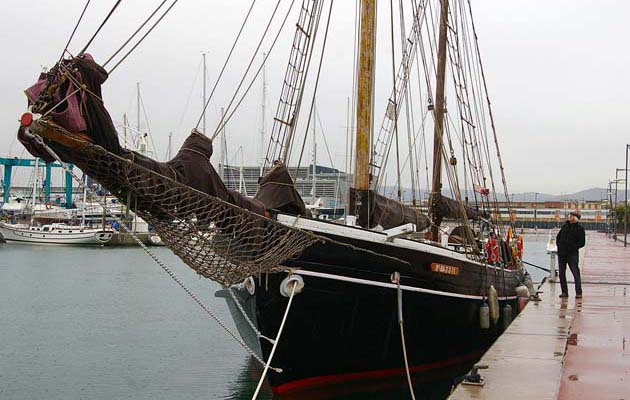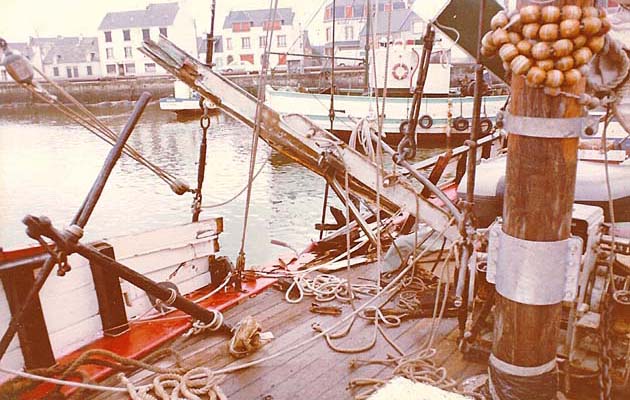Tom Cunliffe introduces an extraordinary extract from the life and times of Clare and Edward Allcard aboard their ex-Baltic Trader Johanne.
I signed on as crew in 1969 and left the ship in Madeira the following spring. Johanne finally cruised into the Islands where all manner of misfortune befell her before she was purchased by none other than Edward Allcard, mariner and author extraordinaire.
Allcard, who is still with us aged 102, sailed her to many exotic destinations with his wife, Clare, daughter Katy and various crewmembers. The boat proved a faithful servant, but, as her time with me and my shipmates had shown, she did have a tendency to get into trouble now and then.
In this extract from Clare Allcard’s book from 1992, A Gypsy Life, republished by Imperator in December 2016, Johanne survives a devastating ramming in colourful style.
These days she can be found in Spain as the Ciutat Badalona, inspiring a new generation of sailors as she once did me.

Half an hour after midnight on December 10th, 1976, we set sail from the United Kingdom bound for France and the Seychelles. A splendid romping sail brought us off the French coast at first light.
Passing inside Ushant, we made for the dreaded Bay of Biscay.
The four of us, our crew John and Lana Campbell plus Edward and myself, were taking equal tricks at the helm and, by midmorning, it was my turn to steer.
Before long a hulking French trawler had me watching apprehensively over my shoulder as she advanced toward us under power. The helmsman must surely have seen Johanne, yet still he came on.
Losing my nerve, I called below to Edward. He was on deck in a flash. One glance, though, and he relaxed, except that my anxiety irritated him.
“Don’t be stupid. They saw us ages ago. They won’t ram us.” And they didn’t.
Instead the great bully came to within a few feet of our stern and stopped dead. Though this time no physical harm was done, that skipper had laid the psychological groundwork for what followed.

All that day Katy wrestled with seasickness and Johanne fought against headwinds and a nasty slop. In all we fought for 18 hours to get south of Penmarc’h lighthouse and still failed.
We made longer and longer legs out to sea only to lose what little we had gained when we tacked back toward the shore, yet Edward, an ardent lover of pure sail and an obstinate cuss to boot, refused to give in.
As luck would have it, I was again at the helm at 4:30pm when Johanne reached the lighthouse and tacked for yet another long leg out to sea.
Five miles to the south lay the fishing port of Guilvinec. Coming from the north and heading down the coast across our bows was the Guilvinec fishing fleet pounding home to sell their catch in the evening market.
As we cut at right angles through the fleet a couple of fishing boats did alter course a spoke or two to pass astern of us. Then I spotted one whose bearing remained steady against Johanne’s forward shrouds.
I checked and checked and checked again before calling Edward. And this time he was not quite so quick to respond, though even then it needed but a slight twist of the fishing boat’s wheel for it to pass well clear of us.
Seizing the foghorn he delivered a mighty salvo. Wholly oblivious, the fishing boat continued to bear down on us at eight knots.
All Edward could do was jam the wheel hard over, luffing Johanne into the wind to stop her.
The rest was a nightmare, like one of those dreams where you try desperately to run from certain death but your legs won’t move, your eyes can’t see to find an escape, and you open your mouth to scream for help and no sound comes.
I was in that dream. Totally powerless to stop the thing that was hurtling toward us, I stood suspended in time and unable to move.
Seconds later the two boats collided. With a sickening shriek of tortured wood, the fishing boat’s stem smashed into Johanne’s side at the main starboard shrouds.

The pin rail broke clear. The main throat and jib halyards snaked aloft as the mainsail collapsed down the mast, its heavy wood gaff swinging free.
John, who had emerged from the saloon clasping a peanut-butter sandwich, hurled it in fury at the fishing boat’s wheelhouse. And still the man at the wheel did not respond.
The reason was simple – there was no man at the wheel. Every one of that fishing boat’s crew was in the hold sorting fish.
Not that the fishermen stayed sorting fish for long. The crash brought them scuttling on deck, white as cooked cod, and quite as shocked as we were.
Their boat, Bellatrix, had rammed us with such force that she pushed Johanne onto the other tack. That, as it turned out, was just as well, for Johanne had been holed to within an inch of her waterline, her bulwarks and planking shattered for several feet.
Nevertheless, the old lady had surely proved her worth. In 18 inches of planking, frames, and deck, she had stopped dead a heavy, 50-foot fishing boat traveling at speed. Most boats would have been cut in two.
Now, with the weight of both sails and booms to port, she was heeled over just enough to keep the lower edge of her holed starboard side above water. Only the wave tops sloshed in.




